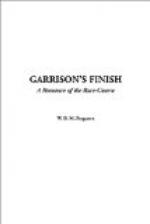“Gladly, willingly,” whispered the girl. She was crying inwardly.
His eyes flamed for an instant, and then died away. By sheer will-power he succeeded in stretching a hand across the coverlet, palm upward. “Put—put it—there,” he whispered. “Will you?”
She understood. It was the sporting world’s token of forgiveness; of friendship. She laid her hand in his, gripping with a firm clasp.
“Thank you,” he whispered. Again his eyes flamed; again died away. The end was very near. Perhaps the approaching freedom of the spirit lent him power to read the girl’s thoughts. For as he looked into her eyes, his own saw that she knew what lay in his. He breathed heavily, painfully.
“Could—could you?” he whispered. “If—if you only could.” There was a great longing, a mighty wistfulness in his voice. Death was trying to place its hand over his mouth. With a mighty effort Waterbury slipped past it. “If you only could,” he reiterated. “It—it means so little to you, Miss Desha—so much, so much to—me!”
And again the girl understood. Without a word she bent over and kissed him. He smiled. And so died Waterbury.
Afterward, the girl remembered Waterbury’s confession. So Garrison was honest! Somehow, she had always believed he was. His eyes, the windows of his soul, were not fouled. She had read weakness there, but never dishonesty. Yes, somehow she had always believed him honest. But he was married. That was different. The concrete, not the abstract, was paramount. All else was swamped by the fact that he was married. She could not believe that he had forgotten his marriage with his true identity. She could not believe that. Her heart was against her. Love to her was everything. She could not understand how one could ever forget. One might forget the world, but not that, not that.
True to her code of judging not, she did not attempt to estimate Garrison. She could not bear to use the probe. There are some things too sacred to be dissected; so near the heart that their proximity renders an experiment prohibitive. She believed that Garrison loved her. She believed that above all. Surely he had given something in exchange for all that he owned of her. If in unguarded moments her conscience assumed the woolsack, mercy, not justice, swayed it.
She realized the mighty temptation Garrison had been forced against by circumstances. And if he had fallen, might not she herself? Had it not taken all her courage to renounce—to give the girl up North the right of way? Now she understood the prayer, “Lead us not into temptation.”
Yes, it had been weakness with Garrison, not dishonor. He had been fighting against it all the time. She remembered that morning in the tennis-court—her first intimacy with him. And he had spoken of the girl up North. She remembered him saying: “But doesn’t the Bible say to leave all and cleave unto your wife?”




